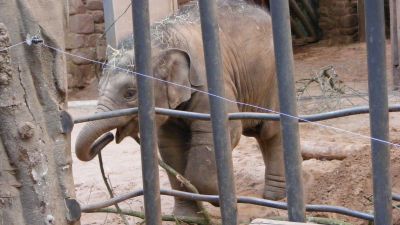Born Free charity calls for UK and Europe to ban elephants in zoos, warning babies die in captivity

An animal rights charity has called for a ban on keeping elephants in captivity - warning of higher infant mortality rates.
But the campaign has sparked push-back from zoos, which insist their conservation work is ensuring the survival of the animals in the wild.
Born Free brands the tourist attractions "net consumers of elephants" - highlighting high infant mortality rates, poor reproductive success and reduced lifespans for those animals in captivity.
There are currently 11 zoos in the UK hosting 49 elephants - with one already in the process of sending its elephants to a reserve in Africa.
In a report backed by conservation campaigners including Chris Packham, Born Free said environment secretary George Eustice must begin the process that would bring about the end of elephants in captivity.
Will Travers, Born Free's executive president, said: "It will take time, we all acknowledge that. For animals still in zoos, we need to create large, spacious enclosures in a sanctuary environment.
"We need to stop attempting to breed them. We should bring no more elephants from the wild.
"Over a period of probably decades, that will see the end of keeping elephants in zoos."
But the Zoological Society for London - which runs London Zoo and Whipsnade Zoo in Bedfordshire, Britain's biggest - has hit back, insisting its work is helping to "ensure the future" of elephants in the wild thanks to its conservation work.
Malcolm Fitzpatrick, chief curator at Whipsnade Zoo, said, as a global conservation charity whose work was "deeply-rooted in science and based on evidence", ZSL provided the best care for the herd of Asian elephants housed at its Bedfordshire site.
There are around 40,000 Asian elephants living in the wild and 400,000 African elephants.
As part of its conservation work, Whipsnade has been creating a database of thermal images which are being used to help populations live safely alongside elephants in the wild.
Mr Fitzpatrick added: "Elephants are hugely intelligent, charismatic and majestic creatures; they are simply enthralling. At ZSL, our visitors’ love for these animals is plain to see, and every visit to see them is an act of support for their conservation.
"A visit to Whipsnade directly supports our global conservation efforts. We want to make sure that these special creatures can not only survive but thrive."
But Born Free's president said its latest report - Elephants in Zoos: A Legacy of Shame - showed arguing that zoos supporting conservation efforts was no longer good enough.
Between 2000 and 2020, 51 elephants were born in captivity in the UK. Over the same time period, 53 died.
The charity said infant mortality was four times higher among elephants in captivity compared with those in the wild, while stillbirths were twice as high.
The average herd size in a UK zoo is three compared with between seven and 16 in the wild, according to the charity.
Mr Travers said Colchester Zoo in Essex had the third smallest elephant enclosure in the UK - at 0.6 hectares. Whipsnade Zoo has the largest at 12.5 hectares.
Damian Aspinall, whose Aspinall Foundation runs two animal parks in Kent and has the UK's largest herd of captive African elephants, said he had decided to send all 14 of them to a sanctuary in Kenya.
"The phasing-out of elephants from zoos is the only option to ensure the long-term protection of elephants," he said.
"There are major challenges when it comes to providing high welfare standardsfor elephants which zoos have not overcome.
"It’s time all zoos did the right thing.
"If they don’t then government must step in to make sure the zoo industry acts without delay to bring this sorry chapter to a close.”